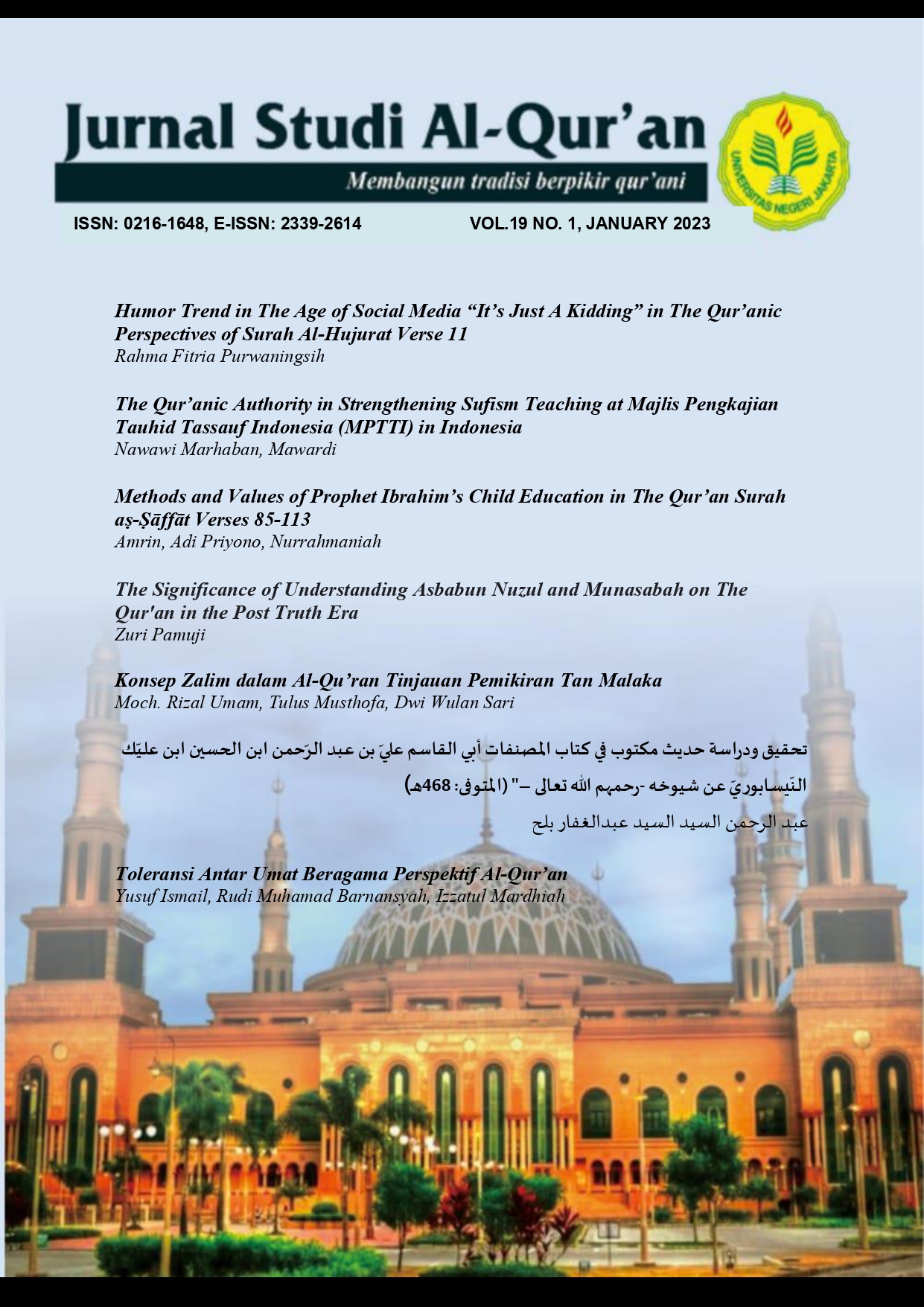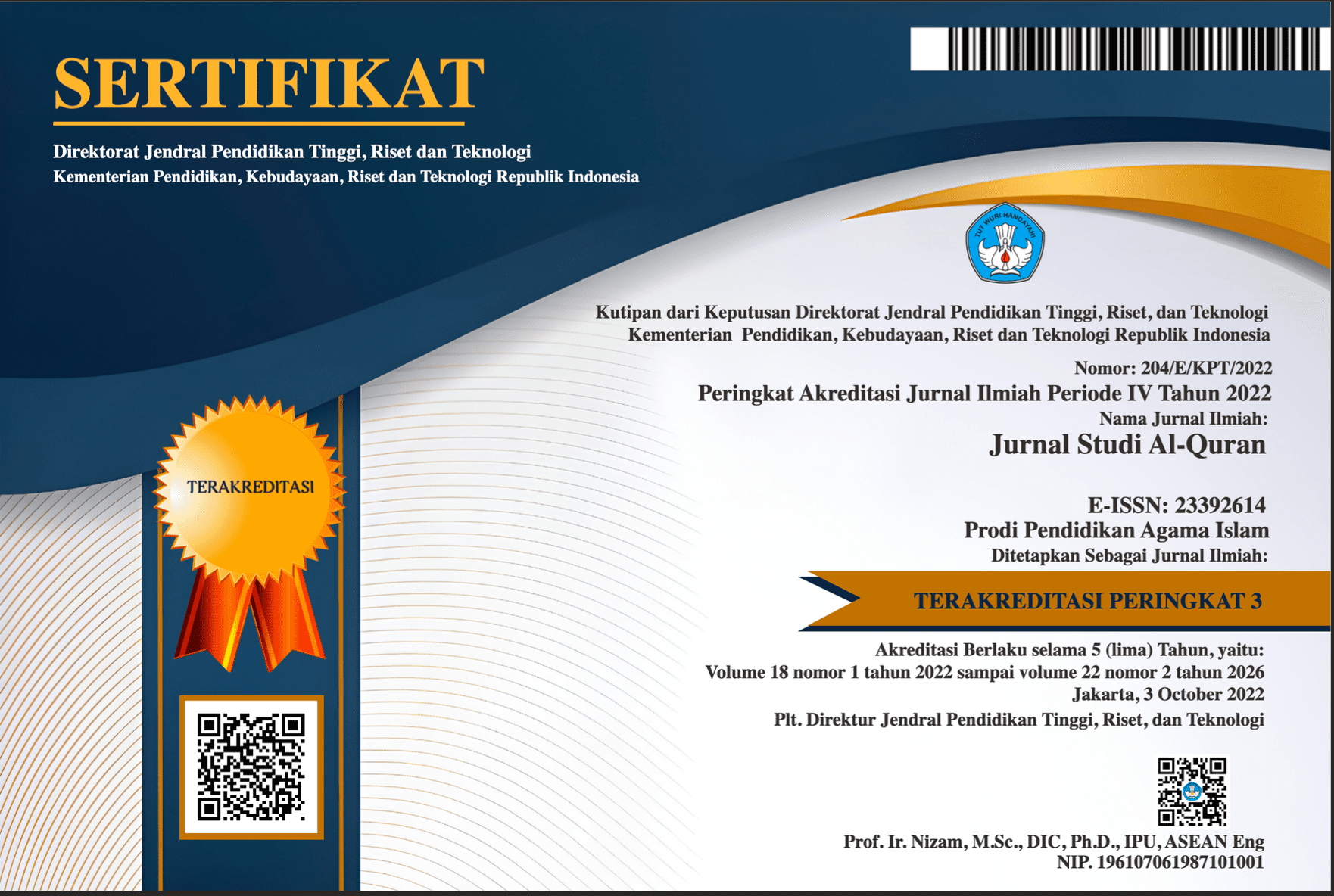Humor Trend in The Age of Social Media “It’s Just A Kidding” in The Qur’anic Perspectives of Surah Al-Hujurat Verse 11
DOI:
https://doi.org/10.21009/JSQ.019.1.01Keywords:
Humor, Islamic Interpretation, Prank, Qaulan, RoastingAbstract
Humor is human nature to feel and share happiness. Nowadays, humor is one of the most popular forms of content, including pranks and roasting themed. This study attempts to review the humor trend in the study of Surah Al-Hujurat verse 11 and the ethics of humor as a form of communication. The research design uses a qualitative literature review study and a content analysis approach. The interpretation of Surah Al-Hujurat verse 11 was collected from several tafsir books, such as Tafsir Al-Maraghi, Tafsir Muyassar, Tafsir Al-Munir, Tafsir Fii Zhilalil Qur’an, Tafsir Al-Azhar, and Tafsir Al-Mishbah. The analysis results illustrate that humor practically is mubah, but some humor trends have made others the object of jokes with humiliating behaviour. Humor in Islam indeed considers the ethics of communication, including surah Al-Hujurat verse 11, which outlines the prohibition of humiliating others, including humor. Nevertheless, humor is permissible communication without turning others into objects of humiliating jokes. As a form of communication, humor requires ethics to avoid humiliating behaviour under the pretext of “it’s just kidding”, including qaulan sadida, qaulan maisura, qaulan layyina, and qaulan ma’rufa.
References
Ahyar, Muzayyin, and Alfitri Alfitri. “Aksi Bela Islam: Islamic Clicktivism and the New Authority of Religious Propaganda in the Millennial Age in Indonesia.” Indonesian Journal of Islam and Muslim Societies 9, no. 1 (2019) https://doi.org/10.18326/ijims.v9i1.1-29.
’Aidh Al-Qarni. Tafsir Muyassar. Jakarta: Qisthi Press, 2007.
Al-Maraghi. Tafsir Al-Maraghi. Beirut, Dar Al-Fikr.
Anshor, Muhtadi. “The Phenomenon of Pranking the Millennial Generation: Between Sad Dzariah and Fath Dzariah” Tribakti: Jurnal Pemikiran Keislaman 33, no. 1 (2022) https://doi.org/10.33367/tribakti.v33i1.1943.
Chang, Chingching. "How morality judgments influence humor perceptions of prankvertising" International Journal of Advertising 40, no. 2 (2020) https://doi.org/10.1080/02650487.2020.1772648.
Dalimunthe dan Sa’adah. “Kontekstualisasi Hadis: Menyikapi Fenomena Prank di Media Sosial” DIROYAH: Jurnal Studi Ilmu Hadis 5, no. 2 (2021) https://doi.org/10.15575/diroyah.v5i2.11212.
Fathiyyah, Rahma Nur, dan Nofha Rina. “Pengaruh Kredibilitas Youtuber Terhadap Sikap Penonton Pada Channel Youtube Atta Halilintar (Studi Kuantitatif pada Penonton Youtube Atta Halilinar di Instagram).” Journal Acta Diurna 15, no. 2 (2019).
Firdaus & Darmalaksana. “Diskursus Humor Dan Etika Dalam Perspektif Al-Qur’an: Sebuah Analisis Psikologi-Sosial” Maghza: Jurnal Ilmu Al-Qur’an dan Tafsir 6, no. 1 (2021) https://doi.org/10.24090/maghza.v6i1.4419.
Hamka. Tafsir Al-Azhar. Jakarta: Gema Insani, 2015.
Heriansyah, Aldini, dan Hanifah. “Era Post Truth: Fenomena Prank dalam Pandangan Hadis dan Pendekatan Sosio-Historis” International Conference on Tradition and Religious Studies 1, no. 1 (2022).
Huda, Nur. “Prank dan Dampak Sosial: kajian Pendidikan Masyarakat dalam Perspektif Pendidikan Islam” Ta’dibi 8, no.1 (2020).
Jarrar dkk. “Perception of Pranks on Social Media” Journal of Communication and Media Technologhies 10 no. 1 (2020) https://doi.org/10.29333/ojcmt/6280.
Khasanah, Faizatun. “The Quranic Communication Ethics In Social Media” Episteme 14, no. 1 (2019) https://doi.org/10.21274/epis.2019.14.1.151-167.
La Tarifu dkk. Etika Komunikasi di Media Sosial. Yogyakarta: Lentera Hati, 2019.
Lisnawati dan Desi Erawati. “Islamic Ethics in Social Media” Episteme 14, no. 1 (2019).
Martin, Rod A. "Sense of Humor and Physical Health: Theoretical Issues, Recent Findings, and Future Directions" De Gruyter Mouton, 17 (2006) https://doi.org/10.1515/humr.2004.005.
Marwan, Iwan. “Rasa Humor dalam Perspektif Agama” Al-Turas 19, no. 1 (2013).
Muslimah. “Etika Komunikasi dalam Perspektif Islam” Sosial Budaya 13, no. 2 (2013).
Mustafid. “Hukum Perbuatan Roasting Dalam Stand Up Comedy Ditinjau Berdasarkan Ketentuan Syari'At Islam” Yurisprudentia: Jurnal Hukum Ekonomi 7, no. 2 (2021).
Narulita, S., Hyangsewu, P., & Diens, A. (2022). Moderate Muslim Characters in The Quran and Its Implementation in Islamic Religious Education Learning in Public Universities. Jurnal Studi Al-Qur'an, 18(1), 75-90.
Nazaruddin dan Alfiansyah. “Etika Komunikasi Islam di Media Sosial dalam Perspektif Al-Quran dan Pengaruhnya terhadap Keutuhan Negara” PEURAWI 4, no. 1 (2021) http://dx.doi.org/10.22373/jp.v4i1.8935.
Perdana, Surya dkk. “Motif dan Kepuasan Subscribers Menonton Video dalam Youtube Channel Lhondokampung” E-Komunikasi 6, no. 2 (2018).
Plester, B., Inkson, K. Doing Humor. In: Laugh out Loud: A User’s Guide to Workplace Humor. Singapore: Palgrave Macmillan, 2019.
Purwaningsih, R. F., & Witro, D. "Prank in Al-Quran and Hadis Perspective" KURIOSITAS: Media Komunikasi Sosial Dan Keagamaan 14, no. 2 (2021) https://doi.org/10.35905/kur.v14i2.2072.
Quthb, Sayid. Tafsir Fii Zhilalil Qur’an. Beirut: Darul Kutb, 1998.
Rahmawan, M. A., Siregar, K. I., & Wajdi, F. (2021). Implementasi Metode Tahsin Al Husna dalam Pembelajaran Jarak Jauh pada Masa Pandemi Covid-19 di SDIT Al Kahfi. Jurnal Studi Al-Qur'an, 17(1), 113-130.
Shihab, Quraish. Tafsir Al-Mishbah. Jakarta: Lentera Hati, 2017.
Sihombing, Lambok H., Farda M. Adzra, R. Rahadi. “Analysis of Kiki Saputri’s Roasting as Critiques Toward Politicians” Academic Journal Perspective: Education, Language, and Literature 9, no. 1 (2021). http://dx.doi.org/10.33603/perspective.v9i1.5150
Sturges, Paul. “The Production Of Comedy: The Joke In The Age Social Media” SAGE (2015).
Wales, Matthew. It’s Just A Prank, bro! University of Minnesota, 2015.
“Facebook’s Top Countries and Cities.” Last modified 2017. https://wearesocial.com/.
“Baim Wong Bikin Konten Prank Polisi, Ahmad Sahroni: Seenak Udel Aja, Norak” insertlive.com, accessed October 31, 2022, https://www.insertlive.com/hot-gossip/20221004105148-7-292207/baim-wong-bikin-konten-prank-polisi-ahmad-sahroni-seenak-udel-aja-norak.
“Viral Video saat Kiky Saputri Gagal Roasting Sule.” suara.com. Last modified March 26, 2021. Accessed June 9, 2022. https://www.suara.com/entertainment/2021/03/26/104227/viral-video-saat-kiky-saputri-gagal-roasting-sule.
Downloads
Published
How to Cite
Issue
Section
License
Authors who publish with this Journal agree to the following terms:
- Author retain copyright and grant the journal right of first publication with the work simultaneously licensed under a creative commons attribution licensethat allow others to share the work within an acknowledgement of the work’s authorship and initial publication of this journal.
- Authors are able to enter into separate, additional contractual arrangementfor the non-exclusive distribution of the journal’s published version of the work (e.g. acknowledgement of its initial publication in this journal).
- Authors are permitted and encouraged to post their work online(e.g. in institutional repositories or on their websites) prior to and during the submission process, as it can lead to productive exchanges, as well as earlier and greater citation of published works.
Users/public use of this website will be licensed to CC BY










